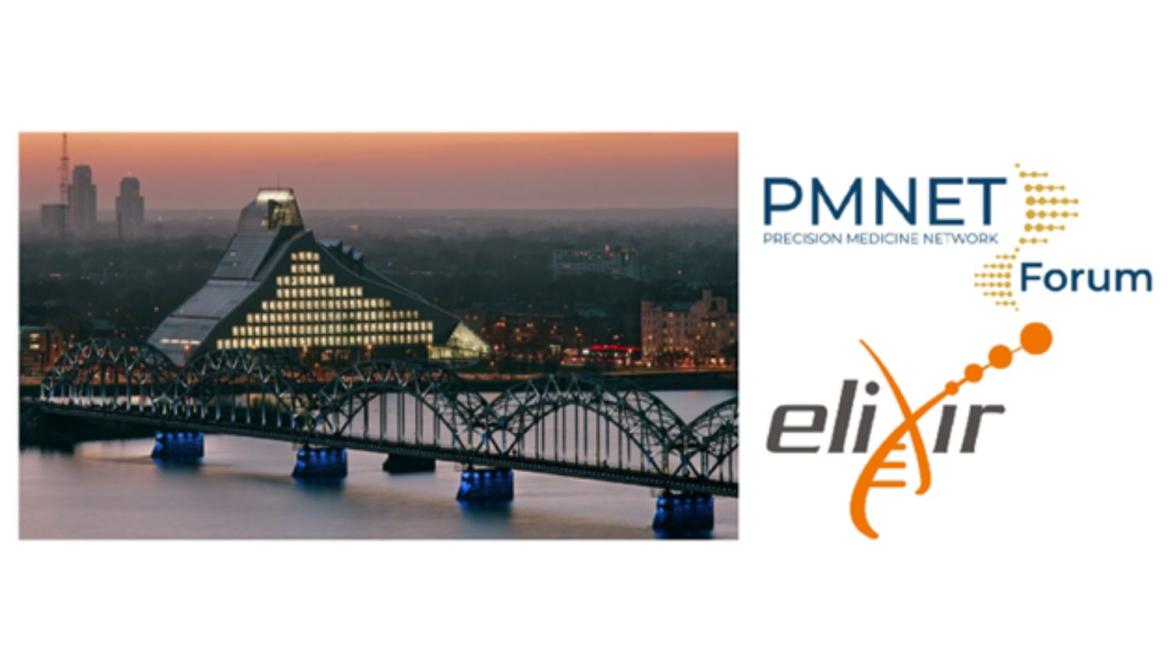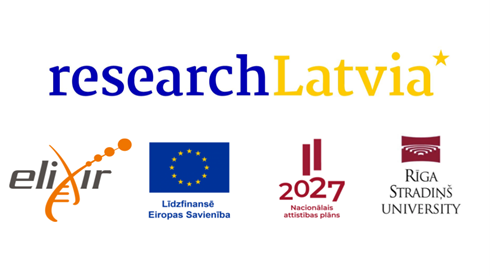
Building Bridges in Bioinformatics: Latvia Signs ELIXIR MoU at PMNET Forum 2025
October 14, 2025
The annual PMNET Forum took place on October 9–10, 2025, at the National Library of Latvia in Riga. This year’s event featured a dedicated session on ELIXIR—the European Life Science Infrastructure for Biological Information—highlighting its growing relevance to Latvia’s research infrastructure landscape. The session was organised with the support of Rīga Stradiņš University, as part of its participation in the Horizon Europe programme (Project No. 1.1.1.5/3/25/I/014).

The session opened with a milestone event—the official signing of the Latvian National Memorandum of Understanding on Participation in the ELIXIR Consortium. This agreement formalised the commitment of the first four national institutions—Rīga Stradiņš University, the University of Latvia, the Latvian Biomedical Research and Study Centre, and the Children’s Clinical University Hospital—to jointly establish the Latvian ELIXIR Node. Several additional partners are expected to join in the near future. This landmark step marks the beginning of Latvia’s deeper integration into the ELIXIR ecosystem, strengthening its role in the European life sciences data infrastructure.
The session continued with three outstanding presentations. The first speaker was Andrew Smith, Head of External Relations at the ELIXIR Hub in the UK, who attended in person. His talk, titled "ELIXIR Europe: Opportunities for the Latvian Life Science Community", offered valuable insights into ELIXIR’s strategic direction and highlighted the opportunities it presents for Latvian researchers, institutions, and national infrastructure. He provided an overview of ELIXIR’s structure as a European intergovernmental organisation that supports life science data management through a federated network of national Nodes. Smith outlined how ELIXIR builds capacity via services, tools, training, and collaborative projects, and explained its diverse funding streams—including Horizon Europe and national roadmaps. He also showcased the benefits of joining ELIXIR’s expert Communities, Commissioned Services, and EU projects, and emphasised the value of participating in flagship events like BioHackathon Europe and ELIXIR Industry Days. Latvia’s integration, he noted, would open new pathways for engaging with European research, infrastructure development, and innovation in genomics and data-driven science.
Andrew’s emphasis on cross-border collaboration and trusted data ecosystems set the stage perfectly for the next speaker, shifting the focus from opportunities to practical implementation—particularly in the vital domain of Research Data Management (RDM). The second speaker, Dr Munazah Andrabi, Deputy Lead of the UK RDM Club at ELIXIR-UK, joined the session remotely. Her presentation, titled "FAIR by Design: Best Practices in Research Data Management and the ELIXIR RDM Ecosystem", offered a compelling and practical guide to building data that is trustworthy, interoperable, and reusable. Dr Andrabi explored the “What, Why, and How” of RDM, highlighting its growing role as a cornerstone of good scientific practice. She explained how RDM enhances the reproducibility of research and ensures compliance with legal, ethical, and funder requirements. Central to this shift are the FAIR principles—Findable, Accessible, Interoperable, and Reusable—which now serve as a global standard for maximising the long-term value and impact of research data. Through a comprehensive overview of the ELIXIR RDM ecosystem, she introduced key tools and resources that support researchers in managing their data effectively throughout its entire lifecycle, from collection and documentation to sharing and reuse. Her talk underscored the critical role of RDM in advancing Open Science and enabling meaningful international collaboration.
To conclude the session, we brought the focus back home—with a compelling, real-world example from Latvia. The Data Curator Unit at Rīga Stradiņš University presented a case study titled "Accelerating Open Science in Latvia: A Case Study from Rīga Stradiņš University’s Participation in a National Data Steward Network." Their talk illustrated how involvement in a national data stewardship network is actively advancing Open Science practices within RSU and across Latvia. By embedding research data management into institutional workflows and culture, their work stands as a model for how local action can drive systemic transformation. This final presentation grounded the session’s broader themes in tangible progress and impact, showing not only why Latvia is joining ELIXIR—but also how: through collaboration, coordination, and a shared commitment to excellence in life science data infrastructure.
